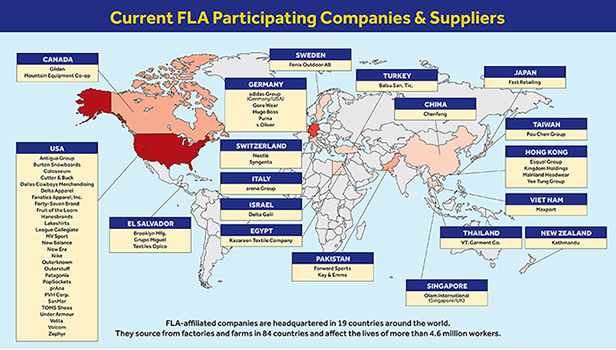News March 25, 2019
FLA Will Require Affiliates To Publicly Reveal Factories
The move can impact promo firms seeking FLA accreditation – and help protect factory laborers from abuse.
The Fair Labor Association (FLA) plans to require affiliate companies to disclose their supplier lists – a move advocates say will lead to enhanced transparency and increased brand/corporate responsibility regarding workers’ rights in global supply chains.
The FLA believes that requiring affiliates to publicly share their factory sources will help promote better working conditions for laborers.
The mandate would apply to any brand/company seeking FLA certification, which the nonprofit grants to companies that undergo an evaluation to ensure their supply chains are free of human rights abuses.
Firms, including those in the promotional products industry seeking or wishing to maintain FLA certification, would be subject to the requirements. Promotional products-related companies that are FLA-certified include suppliers like Gildan (asi/56842), Delta Apparel (asi/49172), Cutter & Buck (asi/47965), Antigua Group (asi/36320), HanesBrands (asi/59528), SanMar (asi/84863) and MV Sport (asi/68318).

Source: FLA
“Transparency needs to be a cornerstone of any serious effort by brands to build a supply chain free from serious rights abuses,” said Aruna Kashyap, senior women’s rights counsel at Human Rights Watch, a New York-based NGO that conducts research and advocacy on human rights. “The FLA’s decision is a significant step forward, and others need to follow.”
It’s unclear when the FLA’s factory disclosure requirement will take effect. The organization recently revealed publicly that its board had voted in favor of the mandate in late February. The plan is for the details – including those pertaining to enforcement – to be hashed out over the course of 2019.
The @FairLaborAssoc board voted today to require factory list #transparency. #Thanks to @hrw @ajkashy @cleanclothes @ilrf @Judy_Gearhart @uniglobalunion @PJenningsUNI @IndustriALL_GU @ValterSanches @theICAR @NicoleLVander @4WorkerRights @SharanBurrow @ituc
— Fair Labor Association (@FairLaborAssoc) February 27, 2019
Members of the Transparency Pledge Coalition, a group of global unions and other independent labor rights and human rights organizations, said they’ll be keeping watch to make certain the FLA’s decision is implemented – and given the teeth it needs to succeed.
“While disclosure of factory lists will not automatically lead to improved working conditions on the ground, it is a critical first step towards that goal,” said Nicole Vander Meulen, the International Corporate Accountability Roundtable’s legal and policy coordinator.
Vander Meulen added: “In addition to enhancing companies’ due diligence, it strengthens accountability by enabling workers and their advocates to bring human rights abuses to the attention of the brands for which they are producing. Other MSIs should take note of the FLA’s decision and follow suit.”
Advocates have also pointed out that a supply chain in which workers are treated ethically benefits not just the laborers, but also brands and companies. One way that’s so is that it helps such entities avoid the severe public backlash that can occur when a company’s supply chain is tied to human rights abuses. The promo industry has experienced fallout from such a scandal recently.
Headquartered in Washington D.C. with offices in China and Switzerland, the FLA is a collaborative effort of universities, civil society organizations and socially responsible companies dedicated to protecting workers’ rights around the world.
